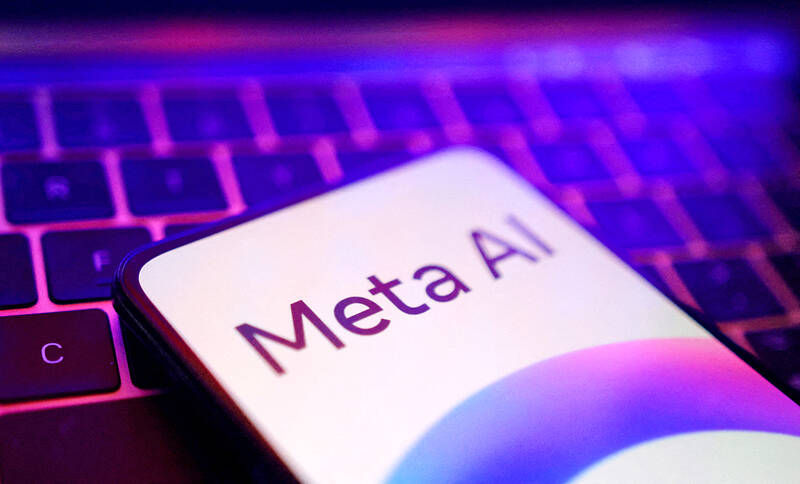Facebook parent company Meta Platforms Inc delayed its launch of the Meta artificial intelligence (AI) chatbot in Europe after regulators on the continent requested that the company pause its plan to train its large language models with posts from users there.
On Monday last week, Meta announced its intention to start training its large language model, called Llama, using public posts generated by European users.
On Friday, it updated that statement to say those plans have been delayed indefinitely after the Irish Data Protection Commission pushed back on the decision.

Photo: Reuters
“This is a step backwards for European innovation, competition in AI development and further delays bringing the benefits of AI to people in Europe,” Meta wrote in a blog post. “Put simply, without including local information we’d only be able to offer people a second-rate experience. This means we aren’t able to launch Meta AI in Europe at the moment.”
A Meta spokesperson confirmed the company still plans to bring these products to Europe, but declined to share a timeline for when that would happen. At the end of last year, Facebook had 308 million daily active users in Europe, to the company’s financial statements showed.
Meta has been pouring significant resources into AI technology to keep pace with other tech giants, including Alphabet Inc’s Google, Microsoft Corp and OpenAI. The company debuted its latest large language model, Llama 3, in April, and already offers its Meta AI assistant to users of its apps in the US. Large language models are the technology that underpins types of generative AI, including chatbots.
On Thursday, Meta was hit with a Norwegian complaint over its plans to use the images and posts of users on Facebook and Instagram to train AI models.
The process to opt out breaches strict EU data protection rules and “has been made deliberately cumbersome by using deceptive design patterns and vague wording,” the Norwegian Consumer Council said in a statement.
“We are urging the Data Protection Authority to assess the legality of Meta’s practices and to ensure that the company is operating in compliance of the law,” Norwegian Consumer Council director-general Inger Lise Blyverket said in the statement.
The legal complaint was written by the European Center for Digital Rights and would be submitted to the Norwegian Data Protection Authority and other European data protection authorities.
The Irish Data Protection Commission is the lead authority for Meta, which has its EU base in Dublin.

Taiwan Semiconductor Manufacturing Co (TSMC, 台積電) would not produce its most advanced technologies in the US next year, Minister of Economic Affairs J.W. Kuo (郭智輝) said yesterday. Kuo made the comment during an appearance at the legislature, hours after the chipmaker announced that it would invest an additional US$100 billion to expand its manufacturing operations in the US. Asked by Taiwan People’s Party Legislator-at-large Chang Chi-kai (張啟楷) if TSMC would allow its most advanced technologies, the yet-to-be-released 2-nanometer and 1.6-nanometer processes, to go to the US in the near term, Kuo denied it. TSMC recently opened its first US factory, which produces 4-nanometer

PROTECTION: The investigation, which takes aim at exporters such as Canada, Germany and Brazil, came days after Trump unveiled tariff hikes on steel and aluminum products US President Donald Trump on Saturday ordered a probe into potential tariffs on lumber imports — a move threatening to stoke trade tensions — while also pushing for a domestic supply boost. Trump signed an executive order instructing US Secretary of Commerce Howard Lutnick to begin an investigation “to determine the effects on the national security of imports of timber, lumber and their derivative products.” The study might result in new tariffs being imposed, which would pile on top of existing levies. The investigation takes aim at exporters like Canada, Germany and Brazil, with White House officials earlier accusing these economies of

Teleperformance SE, the largest call-center operator in the world, is rolling out an artificial intelligence (AI) system that softens English-speaking Indian workers’ accents in real time in a move the company claims would make them more understandable. The technology, called accent translation, coupled with background noise cancelation, is being deployed in call centers in India, where workers provide customer support to some of Teleperformance’s international clients. The company provides outsourced customer support and content moderation to global companies including Apple Inc, ByteDance Ltd’s (字節跳動) TikTok and Samsung Electronics Co Ltd. “When you have an Indian agent on the line, sometimes it’s hard

PROBE CONTINUES: Those accused falsely represented that the chips would not be transferred to a person other than the authorized end users, court papers said Singapore charged three men with fraud in a case local media have linked to the movement of Nvidia’s advanced chips from the city-state to Chinese artificial intelligence (AI) firm DeepSeek (深度求索). The US is investigating if DeepSeek, the Chinese company whose AI model’s performance rocked the tech world in January, has been using US chips that are not allowed to be shipped to China, Reuters reported earlier. The Singapore case is part of a broader police investigation of 22 individuals and companies suspected of false representation, amid concerns that organized AI chip smuggling to China has been tracked out of nations such